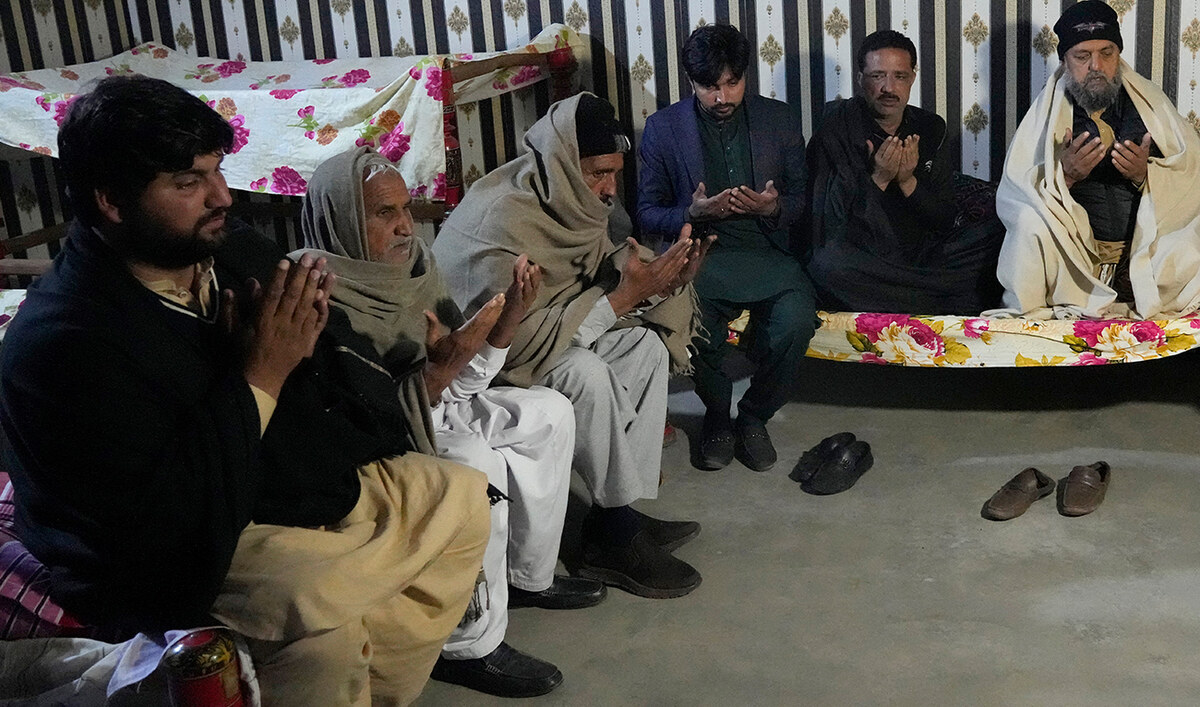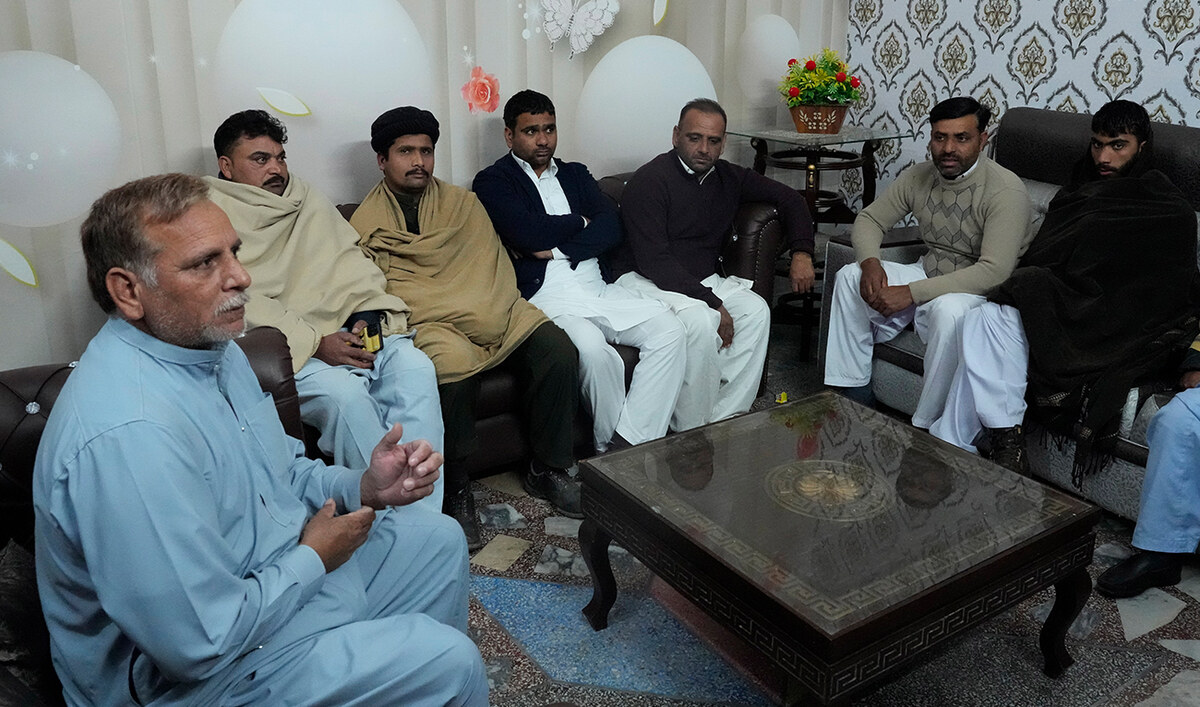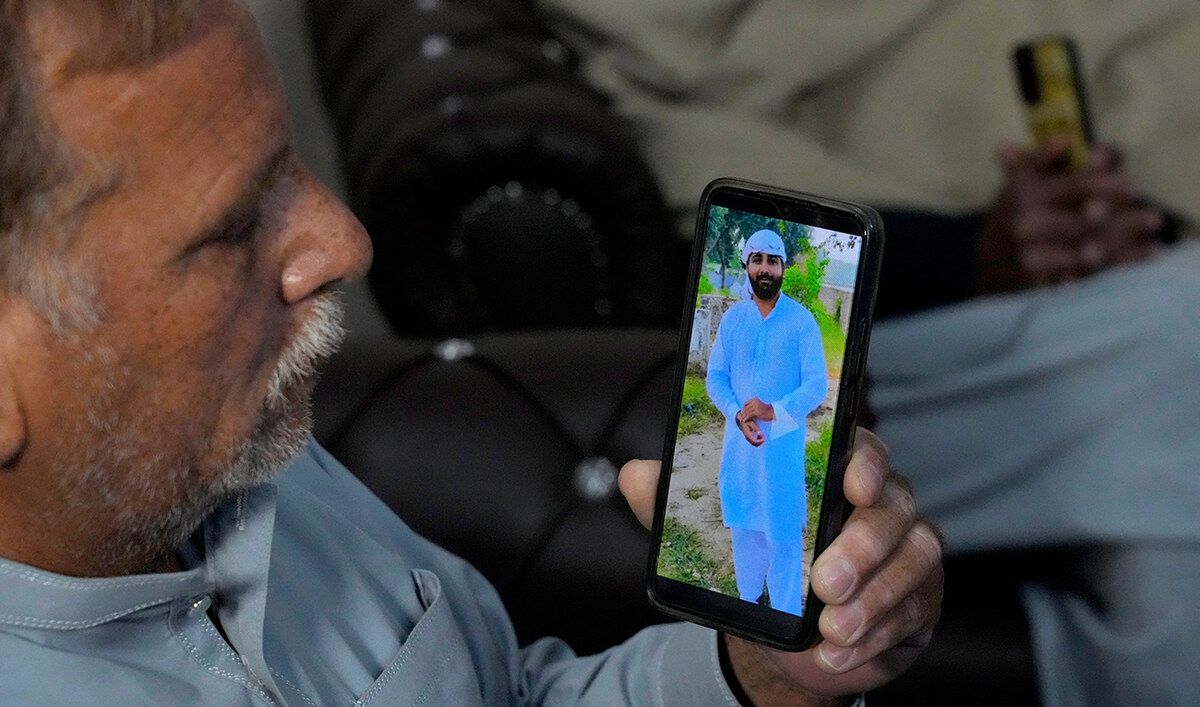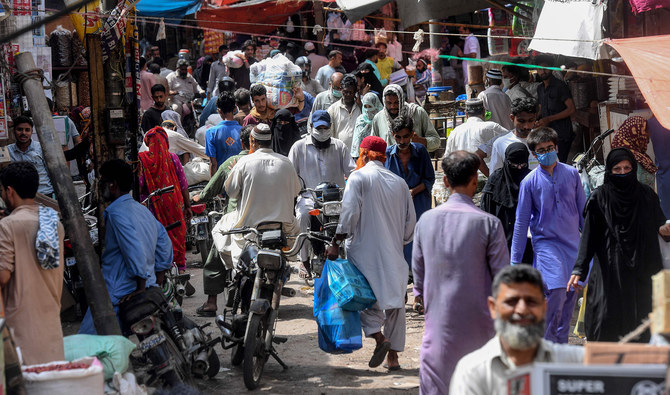ISLAMABAD: Pakistan must take long-term and wide-ranging measures to ensure the revival of its industrial and services sectors, senior economists said after the launch of Pakistan Economic Survey 2019-20 on Thursday, recommending the government to keep the economic targets realistic for the upcoming fiscal year.
The country’s Gross Domestic Product (GDP) growth for the fiscal year 2020 is estimated at negative 0.38 percent due to the negative 2.64 percent and negative 0.59 percent growth in the industrial and services sectors, respectively.
“The clock has turned back. This government started the fiscal year with higher deficit and lower growth and it was ending with the same trend,” Khurram Husain, an economist and business editor at daily Dawn, told Arab News.
He said that much of the negative economic impact on different sectors during the outgoing fiscal year was due to the COVID-19 outbreak, but “still the government should have performed better.”
Husain said the government had initiated macroeconomic adjustments under the International Monetary Fund’s (IMF) $6 billion bailout package, and it would have to take “tough measures” in the upcoming year as well to ensure social protection for the poor and job opportunities for the bulging youth.
Pakistan signed the bailout package with the IMF in May last year to stave off a looming balance of payments crisis. The country had initiated tough economic reforms in the public sector under the program which experts believe resulted in the devaluation of rupee against dollar and high interest rates.
“The good thing, at the moment, is that inflation rate and energy prices are low as compared to the previous months,” Husain said, urging the government to adopt a holistic approach to revive the economy.
Economists said the survey document was a reflection of the “ground realities” and the government should take guidance from it to prepare the budget for the upcoming financial year.
“This was a challenging year. The economy was already in a downturn because of the type of policies we pursued to correct our balance of payments,” Dr. Ashfaque Hasan Khan, senior economist and Principal and Dean of the School of Social Sciences and Humanities at NUST, told Arab News.
He said the economy had contracted, the per capita income had declined and COVID-19 had severely dampened the domestic and global economic activities. “This is the time to provide relief to businesses and people to revive the economy and not to indulge in setting unrealistic revenue targets,” Khan said.
Dr. Vaqar Ahmed, who works as the deputy executive director at the Sustainable Development Policy Institute in Islamabad, said the government had managed to gain “some public sympathy and favor” due to the impact of COVID-19 on the country’s economy in the last two quarters of the financial year.
However, he added: “It has clearly failed to come up with viable structural reforms targets agreed with the IMF like circular debt plan, privatization of public entities and overcoming losses in public sector enterprises.”
Ahmed suggested the government to present a clear-cut policy on tax targets, power sector subsidies for consumers and provincial revenue surpluses in the upcoming budget to revive the economy
“The economic revival remains the real challenge for the government, and this can only be achieved through transparency in each sector and good governance,” he added.
Wide-ranging measures required to boost Pakistan’s economy — experts
https://arab.news/jdjj7
Wide-ranging measures required to boost Pakistan’s economy — experts

- Economists ask the government to set realistic revenue targets to revive the economy
- Say the government had failed to achieve structural reform targets that were agreed with the IMF
Pakistan, Britain reaffirm their resolve to further strengthen bilateral ties

- British high commissioner meets Pakistan's Planning Minister Ahsan Iqbal to discuss bilateral cooperation
- Iqbal highlights financial sector's importance in promoting export growth, enhancing agricultural exports
ISLAMABAD: Pakistan and the United Kingdom reaffirmed their resolve to further strengthen bilateral relations to ensure mutual economic development, state-run media reported this week.
UK's High Commissioner to Pakistan Jane Marriott met Pakistan's Planning Minister Ahsan Iqbal on Saturday during which Pakistan's measures to improve its economy came under discussion.
Iqbal spoke about Islamabad's efforts to eradicate basic education deprivation through public-private partnerships, provincial cooperation to enhance capacity in education, health, and human resources, and significant budget increases for higher education, state broadcaster Radio Pakistan reported.
"Pakistan and Britain have reaffirmed the commitment to foster stronger ties and collaborative efforts for mutual growth and development," Radio Pakistan said in its report.
The minister told the British official that Pakistan's economic strategy includes its aims to address five critical areas including exports, e-Pakistan, environment and climate change, energy and infrastructure, equity and empowerment.
He stressed the importance of Pakistan's financial sector in promoting export growth, enhancing agricultural exports, fostering industrial development and advancing critical areas such as IT, services, mining, workforce export, the blue economy, and innovation, the report said.
Pakistan and the UK have strong military, economic and educational ties, with the latter hosting a large Pakistani diaspora.
Pakistani neuroscientist accused of 'terrorism' calls for pardon before Biden leaves office

- Dr. Aafia Siddiqui was sentenced to 86 years in prison on multiple charges, including attempting to kill US nationals
- Her lawyer has submitted a dossier to Biden, who has until Monday to grant clemency before Trump's swearing-in
KARACHI: A Pakistani neuroscientist accused of "terrorism" by Washington has appealed to outgoing US President Joe Biden to grant her clemency before he hands over the reins of the country to President-elect Donald Trump, her lawyer said this week.
Dr. Aafia Siddiqui, a US-trained neuroscientist, was convicted in 2010 on multiple charges, including attempting to kill US nationals. She became a suspect after leaving the US and marrying a nephew of Khalid Sheikh Mohammed, a self-proclaimed mastermind of the Sept. 11, 2001, attacks.
Siddiqui was wounded during a confrontation with US officials in Afghanistan in 2008, with some reports suggesting she shot at the Americans. She was sentenced to 86 years in prison in 2010, prompting a huge outcry from Pakistan and human rights voices worldwide.
Dr Siddiqui's lawyer, Clive Stafford Smith, has submitted a 76,500-word dossier to Biden and is calling on the American president to pardon him before Trump's swearing-in on Monday.
"We just pray and keep our fingers crossed and I hope to goodness our clemency is granted Monday morning," Smith said in a video message on Saturday.
"And if not, revert to plan B and plan C and plan D until we get her out of this awful place," he added.
Smith said Siddiqui was "in good spirits" when he met her on Friday at the detention facility in Fort Worth, Texas, for four hours despite her trauma. He said Dr. Fowzia Siddiqui, her sister, had traveled 10,000 miles to see her sister but was only allowed 40 minutes to see her sister.
Prime Minister Shehbaz Sharif also wrote a letter to Biden in October 2024, calling for Siddiqui's release.
In the letter, Sharif stressed that several Pakistani officials had made consular visits to her in prison, raising "serious concerns" about her treatment while incarcerated.
The prime minister said her time in prison had "severely impacted her already fragile mental and frail physical health," adding: "In fact, they [the officials] even fear that she could take her own life."
Biden has until Monday to grant Siddiqui clemency. So far, he has issued 39 pardons and commuted 3,989 sentences.
According to Sky News, Smith claims a catalog of intelligence errors led to her initially becoming a suspect, citing witness testimonies that were unavailable at the time of her trial.
Smith said US intelligence "got the wrong end of the stick in the beginning" as agencies thought Siddiqui was a nuclear physicist working on a radioactive bomb "when she really did her PhD in education".
He said this happened as the US was "terrified of terrorists getting their hands on WMD (weapons of mass destruction)", adding: "She's no more of a terrorist than I am".
The US Department of Justice did not respond to Sky News.
Pakistani authorities arrest suspected human smuggler linked to last year’s Greece boat tragedy

- FIA says it found evidence of human smuggling from the suspect's mobile phone after arrest
- Abdul Salam allegedly extorted Rs4.5 million from a victim who drowned in the boat tragedy
KARACHI: Pakistani authorities on Saturday announced the arrest of a suspected human smuggler from Azad Kashmir, accusing him of involvement in last year’s Greece boat tragedy that killed five nationals and charging him with sending one victim abroad after taking Rs4.5 million ($16,200).
The incident occurred in December when a wooden vessel carrying migrants, which departed from Libya, sank off the southern Greek island of Gavdos. The government has intensified its crackdown on human smugglers in recent months, leading to several arrests.
The latest detention comes just days after another boat capsized off Morocco’s coast, where over 40 Pakistanis are feared to have drowned.
“The smuggler involved in the Greece boat tragedy has been arrested,” the Federal Investigation Agency (FIA) said in a statement. “The accused, Abdul Salam, was apprehended during a raid in Bhimber, Azad Kashmir.”
“He was part of a gang involved in human trafficking and extorted Rs4.5 million from victim Ahsan Ali for facilitating his travel to Europe,” it added.
The FIA said the suspect and his associates had kept the victim in safe houses in Libya before coercing him to board the ill-fated boat to Greece. Ali, who hailed from Jalalpur Jattan, died in the shipwreck.
The FIA informed that evidence related to human smuggling was recovered from the suspect’s mobile phone, and investigations were ongoing to track down his accomplices.
“We are using all resources to ensure the arrest of those involved in these tragic incidents,” said Abdul Qadir Qamar, Director of FIA’s Gujranwala Zone. “Raids are being conducted to apprehend the remaining suspects.”
The FIA reiterated its commitment to bringing human smugglers to justice.
“No one will be allowed to play with the lives of innocent people,” the statement said. “Those responsible will face severe punishments based on solid evidence.”
Pakistani humanitarian organization unveils Rs15 billion ‘Rebuild Gaza’ initiative

- Alkhidmat Foundation has previously carried out Gaza relief activities worth about Rs5.5 billion
- ‘Rebuild Gaza’ will help reconstruct a hospital, schools and mosques, provide temporary shelters
ISLAMABAD: A Pakistani humanitarian organization on Saturday announced a Rs15 billion ($54 million) “Rebuild Gaza” initiative over the next 15 months, following the announcement of a ceasefire in the Palestinian enclave.
The ceasefire, which begins on Sunday, comes after extensive negotiations involving Qatar, Egypt and the United States. It will end the conflict that began in October 2023, killing over 46,000 Palestinians and leaving Gaza’s infrastructure in ruins.
The Alkhidmat Foundation Pakistan, which has previously carried out relief activities worth Rs5.5 billion ($20 million) in Gaza, announced the initiative during a press briefing. The new program will build on previous efforts, raising its total aid commitment to Rs20 billion ($72 million) within a little more than a year.
“The people of Pakistan have always stood by their brothers and sisters in Gaza during times of crisis, and we are hopeful they will once again contribute wholeheartedly to this noble cause,” the foundation’s president, Dr. Hafeez Ur Rehman, said, as per a statement.
The “Rebuild Gaza” plan includes providing temporary shelters, essential supplies such as food and medicines, mobile health units and ambulances.
It also aims to reconstruct five damaged schools, rehabilitate one hospital, rebuild 25 mosques and launch over 100 clean water projects.
Additionally, a residential tower will be constructed to provide housing, and 3,000 orphaned children will receive long-term sponsorship.
Dr. Rehman said the foundation, in collaboration with its partner organizations, remains steadfast in its commitment to delivering aid and ensuring the rehabilitation of affected communities in Gaza.
Pakistan’s deputy PM orders timely assistance for victims of Morocco boat tragedy

- More than 40 Pakistanis are feared to have drowned while attempting to reach European shores
- Pakistan has intensified efforts against human smugglers who facilitate journeys for illegal migrants
ISLAMABAD: Pakistan’s Deputy Prime Minister (DPM) Ishaq Dar on Saturday instructed the government to provide timely assistance to the victims of a recent boat tragedy off the coast of Morocco, where more than 40 nationals of his country are feared to have drowned while attempting to reach European shores.
Pakistan’s foreign office confirmed on Thursday that a migrant boat with 80 passengers on board, including several Pakistanis, had capsized near Morocco en route to Spain.
According to Moroccan authorities, 36 people were rescued on Wednesday from the vessel, which had departed Mauritania on January 2 with 86 migrants on board, including 66 Pakistanis, according to minority rights group Walking Borders.
The group’s CEO, Helena Maleno, said 44 of the 50 presumed dead were from Pakistan. The boat was reportedly heading toward Spain’s Canary Islands when it capsized.
Dar, who also serves as Pakistan’s foreign minister (FM), held a meeting in Islamabad earlier in the day to review the situation.
“The DPM/FM issued instructions for coordination of government response and asked the Ministries of Foreign Affairs and Interior to ensure provision of efficient and timely assistance to the Pakistani victims of the tragedy,” the foreign office said in a social media post.
Media reports claim almost all the Pakistanis who were on the boat were from cities in the eastern Punjab province.

The government has intensified its efforts in recent months against human smugglers who facilitate perilous journeys for illegal immigrants to Europe and has made several arrests.
Prime Minister Shehbaz Sharif has called for enhanced cooperation with international agencies, seeking swift action against human trafficking networks.

He has also instructed the Federal Investigation Agency to compile a detailed report on migration-related incidents over the past year and implement an Integrated Border Management System (IBMS) to monitor and prevent illegal movement.
The incident near Morocco once again highlighted the perilous journeys many migrants, particularly Pakistanis, undertake due to conflict and economic instability in their home country.

In 2023, hundreds of migrants, including 262 Pakistanis, drowned when an overcrowded vessel sank in international waters off the southwestern Greek town of Pylos.
It was among the deadliest boat disasters ever recorded in the Mediterranean Sea.











